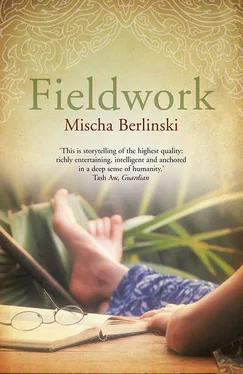"David was a good boy," he said. "Tell me what we ever did to her."
NOT LONG AFTER MY CONVERSATIONwith Mr. Walker, I had reason to visit the Chiang Mai University Library, on business not related to this account. I have always felt that university libraries must be some of the most erotic places on Earth. They are, after all, filled with young people, most of them attractive, and most of them bored out of their skulls. The Chiang Mai University Library is no exception, but it is an eroticism of a particularly sweet sort: a young girl with her long black hair pinned back in an elaborate bow looks up from a chemistry text and with an exasperated sigh pines for distracted Noi across the table. Will he invite her later for noodles? Outside the windows, the palm trees sway, and on the lawns little groups of students giggle. On the wall, the queen of Thailand, the patroness of learning herself, smiles serenely: she, too, was young once, and remembers those precious first minutes at the Royal Palace all those years ago when she was introduced to a handsome young prince who hardly paid her any mind at all!
I finished my business after a few minutes, but something about the place made me reluctant to go straight home, and on a whim I went to the anthropology shelves. The ethnographies were organized geographically, and my eye wandered from continent to continent, from the ferocious Yanomano of the Amazon to the elegant, erudite Dogon of the Sahara to a slender volume explicating the life of a Sicilian village in the 1920s. Chinese villages lay side by side with the Kwakiutl of the Pacific Northwest; Siberian shamans cohabitated with the Pygmies. I felt dizzy for a moment. Spend five minutes in the anthropology stacks of a major university library and gasp at the size of the world, the sheer wonder and diversity of its inhabitants! What sturdy, impressive men and women wrote those volumes! Before I had met Martiya, I had never thought of them at all. Each one had mastered an obscure language, submerged himself or herself in the foreign; those shelves were a testament to curiosity. Every book was the product of an obsession.
The library catalogued the works of Bronislaw Malinowski apart from those of his fellows, which, now that I think about it, is not wholly inappropriate: perhaps it was a kind of homage on some anonymous librarian's part. For it was with Malinowski that the art of ethnography began. I slipped his greatest and most famous work down from the shelves and began to read, surrounded by those sweetly courting undergraduates. And although what follows might seem another digression, it isn't: Malinowski's ghost was there in Dan Loi with Martiya van der Leun.
Born in 1885 into a distinguished family of Kraków aristocrats and intellectuals, Bronislaw Malinowski was originally educated in the hard sciences of mathematics and physics. Sometime in his early twenties he suffered a physical crisis and was advised by his physician that the nervous strain of his studies could overwhelm his fragile constitution. Famous photographs of the man in later life suggest immediately, even to my untrained eyes, why his doctors were concerned: he was a thin-lipped, owl-eyed creature with a long, beaky nose, hollow cheeks, and a very high forehead receding into thin, worried hair. It is the face of an intensely intelligent sparrow or badger. The striking thing about many of these photographs is the contrast between this nervous, high-strung little man and his surroundings: Malinowski is photographed on the most mellow tropical beach imaginable. He is dressed in a round pith helmet and shorts. Tall palms sway in the distance. The sand is white, and a gentle wave is breaking on a gentle shore. Malinowski is surrounded by the natives, who regard him with affectionate, tolerant, bemused stares: the women stand topless, with large pendulous breasts reaching almost to their grass skirts; men and women, black as coal, sport enormous, simply stunning afros. Some of the afros must be a foot of hair in every direction — which makes sense, given that the people of the Trobriand Islands didn't have scissors. The sun is very bright. Malinowski looks miserable.
Malinowski found himself in those tropical islands — the Trobriand Islands, as it happened, off the coast of New Guinea, a place which even the Australians considered impossibly remote and horrible — having been beguiled, as the natives might have said, by the magical influence of a great sorcerer, the Englishman Sir James Frazier, whose contagion was transmitted via Malinowski to Joseph Atkinson, then again to Martiya van der Leun. Having been denied the pleasures of mathematics and physics by his doctors, it was to Frazier's The Golden Bough that Malinowski turned for diversion and consolation; and it was after reading Frazier, with his long lists of fascinating and barely comprehensible primitive rites and rituals, that Malinowski conceived a desperate urge to see a preliterate culture with his own eyes. For unless we understood our own culture, Frazier convinced Malinowski, we could not possibly understand ourselves; and we simply cannot understand our culture from the inside. "We cannot possibly reach the final Socratic wisdom of knowing ourselves if we never leave the narrow confinement of the customs, beliefs, and prejudices into which every man is born," Malinowski wrote, explaining his desire to live in the South Seas. By removing himself entirely from his own society and living with the people of the Trobriand Islands, Malinowski proposed to come to know himself . The greater the immersion in Trobriand society, the more profound his own insights would be. The result of such immersion would be an ethnography, on the one hand, a real contribution to the world's knowledge of its inhabitants, an exhaustive description of a people; and, on the other hand, a transformation of the observer's soul.
That, at any rate, was the theory.
But there is something in those photographs of Malinowski on the beach that isn't quite right, a kind of vague grimace on Malinowski's face. The man looks … constipated. Hideously so, as if it's been weeks since he snuck off to fertilize the jungle, and he's carrying around way more tribal soup than he's comfortable with, and it's hot, really hot, the kind of hot that makes you feel woozy, and it's not even ten in the morning yet; he's sunburned, and he's cranky, and there is sand everywhere, and those people were banging on drums all night long, don't they know any other rhythm than thumpety-thump-thump , and the nearest effective purgative is on the other side of the Pacific Ocean.
Could the opium from his medicine kit be interfering with his digestion? Perhaps.
The impression offered by the photographs is not mistaken. Malinowski — the most famous ethnographer in the history of anthropology, a man said to be possessed (by his contemporary R. R. Marat) of the uncanny ability to wriggle his way into the soul of even the shyest savage — was, in fact, miserable. In 1967, Malinowski's widow, doing the reputation of her late husband absolutely no favors, published the diaries he kept while working in the Trobriands. The truth was out: it seems that Malinowski didn't love anthropological fieldwork quite as much as everyone thought. Malinowski, to judge by his own words, loathed the Trobriand Islands, and detested the Trobriand Islanders. "As for ethnology: I see the life of the natives as utterly devoid of interest or importance, something as remote from me as the life of a dog," Malinowski confided to himself. The natives are variously referred to in the diaries as "fuzzy-headed savages" and "brutes." There are stories in which Malinowski strikes recalcitrant locals. Fieldwork, even for the great Malinowski, was terribly boring, frustrating, dangerous, difficult, enervating, and lonely. Forcing himself to quit the mosquito nets every morning and interview one more damned naked savage about the magical rites found in the coral gardens takes the full measure of Malinowski's discipline. "At bottom," Malinowski wrote, "I am living outside of Kiriwina … strongly hating the niggers."*
Читать дальше












